QuestionI will start of with the separation anxiety. My 1 year old Toy poodle does not mind staying in his cage when the door is open, but he will come out. My problem is when the door closes, he feels like he is in a prison. He will keep whining until we tell him to stop, but after a moment he will continue whining. What should we do to make him feel comfortable in his crate while the door is closed? Because we always keep the crate next to us while we sleep, he also whines when we leave him at home alone, we leave him in his crate for at least 6 hours every week day. The main problem with housebreaking is that we dont know when he needs to "go". He sometimes does his business inside the house, and sometimes when he sneaks upstairs. Can you give us tips or methods on how to train him how to stop housebreaking, and how to train him to tell us when he needs to "go". Thank You :)
Answer
Hi Rudy,
You didn't say if your dog is able to "hold it" for the 6 hours a day that you're crating him. If he's having accidents in his crate, you either need to come home at some point to take your dog outside, or use another method of containment, such as an indoor dog pen, which keeps your dog from having accidents all over your home, but allows your dog an area to "go". Of the two, coming home to take your dog outside is the better option. Enforcing that it's not permissible to EVER go to the bathroom inside the house is far better, and less confusing for the dog. This is the kind of indoor dog pen I'm talking about:
http://www.drsfostersmith.com/images/Categoryimages/normal/p-70237-FS48312-dog.j...
Don't attach your human feelings to your dog being in a crate. Being in a small, safe, contained area is natural for dogs, they don't see it as prison. Dogs have a "denning instinct" that you don't share. Your dog would rather be with you all the time, and that's quite another matter.
The way to get a dog crate trained is to put him in the crate, and not talk or try to comfort him in any way. If staying near the crate while he's in it makes him cry, leave the room. If he whines or cries, tell him quiet, and walk away again.
Only let the dog out of the crate when he's quiet (even if he's only quiet for 30 seconds, it's during those 30 seconds that you let him out of the crate). It will take time, and possibly a pair of ear plugs, because this has been going on for some time, and your dog knows what works. Letting your dog out of his crate when he's crying or fussing only teaches the dog that the crying and fussing is an effective way of getting what he wants, and so the behavior continues.
Very often increasing the amount of exercise a dog receives is the cure stress and making noise while crated. A tired dog is a quiet dog!
It's okay to put soft bedding in the crate, as long as the dog isn't going to the bathroom in it's crate. The crate should only be big enough for the dog to stand up, turn around, and lay down. Any larger and it gives the dog room to relieve himself, and also lay in a dry spot. Crates aren't for going to the bathroom.
This doesn't sound like a case of the dog not being "comfortable" while crated, this sounds like you're giving into your dog's crying and letting him out of his crate too soon. This also doesn't sound like a case of separation anxiety. Dogs with separation anxiety exhibit distress or panic in the form of behavior problems when left alone. Typically, they'll have a dramatic anxiety response within a short time after their owners leave them. Common distress symptoms include one or more of the following: scratching and digging near doors and windows in an attempt to escape and find their people: chewing door frames or other items in an attempt to channel their anxiety, barking, whining and howling in an attempt to summon their person, destructive when left alone, excessive salivation, chewing on or licking themselves, and sometimes even urination and defecation due to the immense physiological effect of prolonged stress.
Small dogs are harder to house train than larger dogs. It's not unusual for a small breed to to take longer than a year to train. Don't try to rely on your dog to "tell" you when he needs to go outside (he's not trained, remember?). Until he is reliably house trained take him on frequent leashed walks on a schedule, and praise him the moment he's finished relieving himself... every time. Let your dog know what pleases you! If he doesn't do all that he needs to do on a walk, as soon as you get back to the house put him in his crate, because you KNOW he still has to "go". Giving him the run of your home only sets him up for a house training accident. In about 15 or 20 minutes take him outside for another try. Be sure to take him out for a walk, both to relieve himself and to get exercise just before you plan on leaving the house for the day. You should leave behind a panting, heaving, utterly exhausted dog as you set off for the day. Give your dog another good long walk as soon as you get home.
An untrained dog shouldn't ever have the unsupervised run of the house... he's not trained after all!! Preventing accidents from ever occurring in the home is YOUR job. If an accident occurs, it seldom is the dog's "fault". Don't yell at or dog or punish him in any way. Besides being counter productive, it teaches the dog nothing. If your dog has an accident in your home, clean it with an enzymatic cleaner, such as Nature's Miracle or Simple Solution, so he won't be attracted back to the area to soil again. Roll up a newspaper and give yourself a whack, because you either weren't watching your dog, or you didn't take him outside soon enough. Promise yourself that you'll do better next time.
Once your dog is reliably house trained, stick to a schedule of walk times rather than expecting your dog to announce when he needs to go outside. An example of a good walk schedule is first thing in the morning before the dog's breakfast, just before you leave the house for the day, as soon as you come home, and a short before you go to bed.
Best of luck,
Patti

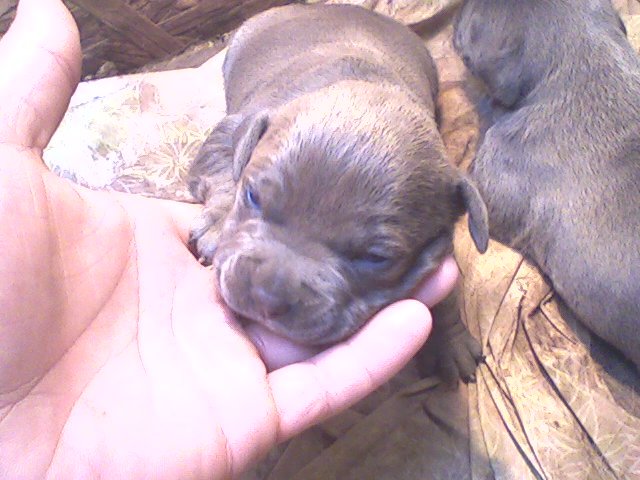 Puppy help? does this look like a nice quality puppy?
Question
3 weeks old
im getting this blue nose puppy so
Puppy help? does this look like a nice quality puppy?
Question
3 weeks old
im getting this blue nose puppy so
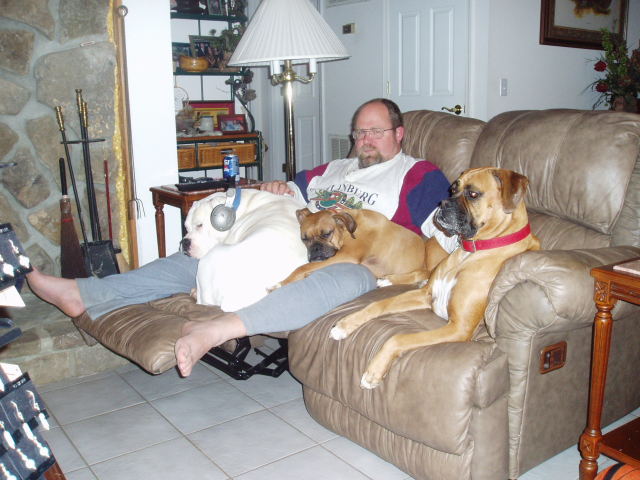 aggressive behavior between my 3 dogs
Question
My loves watching tv
I have always had boxers,
aggressive behavior between my 3 dogs
Question
My loves watching tv
I have always had boxers,
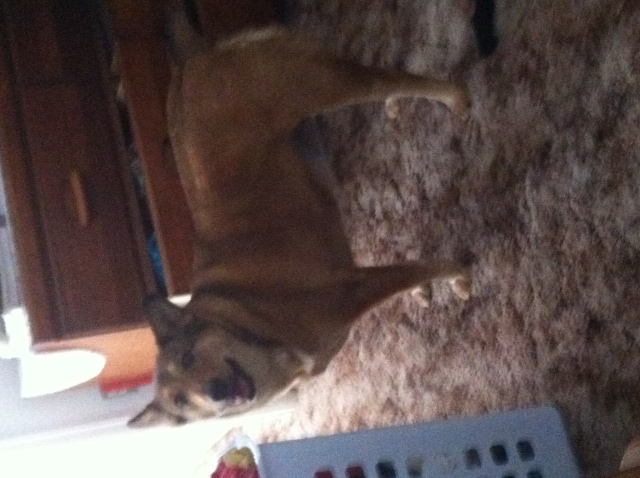 My very overly protective puppy
Question
Marla :)
Hello! I adopted a four year o
My very overly protective puppy
Question
Marla :)
Hello! I adopted a four year o
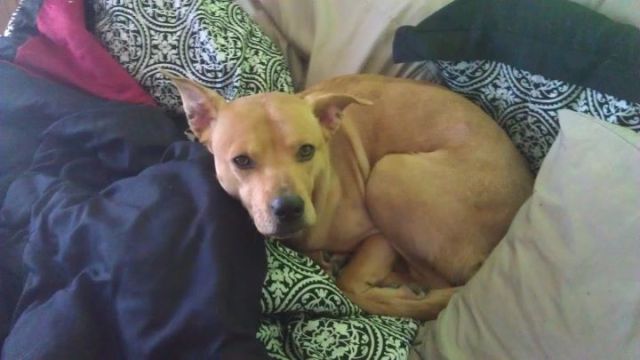 why now?
Question
my dog
I have a 2 year old dog, that mo
why now?
Question
my dog
I have a 2 year old dog, that mo
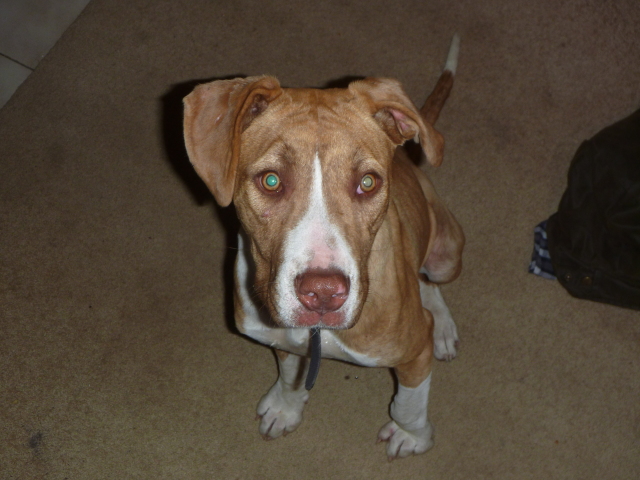 Malnurished Bull Mastif x Great Dane ;
Question
Sticks
Hi,
Ive recently, (the last 24 hours) b
Malnurished Bull Mastif x Great Dane ;
Question
Sticks
Hi,
Ive recently, (the last 24 hours) b